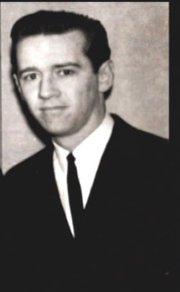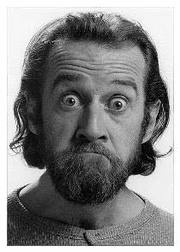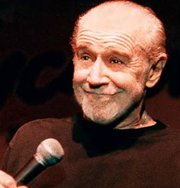
Lenny Bruce. Richard Pryor. George Carlin.
The grand tradition of comedy states that the comic himself feels miserable inside, that the words are weapons, and that the energy required for brilliance on a stage exists only with the help of chemical stimulants.
Which chemical seems hardly to matter. For Pryor it was coke, for Carlin pot. For the earlier generation it was booze. Is it possible to be funny without constantly teetering on the edge of self-destruction?
It is. Bill Cosby. In retrospect perhaps even better than Carlin. But in other ways an ordinary man, with an ordinary life, filled with ordinary disasters, like the loss of his son. Such things happen to everyone, can happen to anyone at any time. A great man and a great comic, from the very beginning to this very day.
(Trivia note. Carlin’s original partner was another like that. Jack Burns. Later half of Burns and Schreiber. Still later the first head writer of The Muppet Show. Edited picture from KXOL. My apologies to Mr. Burns, but I promise the other half of the picture when you go. Rim-shot.)
In some ways we’re all teetering on the edge, aren’t we?
The comic I personally admire most is Jerry Seinfeld. Not because of his stuff.
Because I was privileged to watch him develop it, starting at Birch
Lane Elementary School, nearly a half-century ago now. He was a year
older than I was. I was among the many he would later term "school yard
funny," humorous in our way but not serious about it, not studious. I
do wish I’d been more studious about comedy, less serious about what
was happening around me. Maybe I’d be dead by now, too. (Rim-shot.)
Jerry Seinfeld is studious about it. Always has been. He studied the
greats, like Abbott & Costello, as a child, thanks to TV, and was
able to pull their stuff apart, then put it back together, in order
to come up with his own persona, which emerged fully formed as I was
graduating from college. (UPDATE: As always, it’s best to let Jerry himself explain Carlin’s genius.)
Maybe that’s the key. Maybe TV was Jerry’s drug, the secret sauce
that let him develop his own style in private, until it emerged
Athena-like. Imagine that. TV is good for you. If you’re funny.
Earlier generations of comics didn’t have TV. Carlin certainly
didn’t. He had to build his own persona up in pieces, under constant
pressure from the market. It’s hard to imagine him in a suit and tie,
clean shaven, but that’s how he started, in the early 1960s, one of
hundreds of Bob Newhart clones wandering the country, trying to be
relaxed, secretly mad inside.
Carlin’s persona, like all the comics which preceded him, developed
under klieg lights, in the harsh glare of reality. What emerged,
finally, was the anger of the 1960s, in all its glory. Fast, heavily
verbal, intensely intellectual, but mostly angry. "Well, we’re all
Nixon’s niggers now," he said on an early album, and the crowd went
wild.
The crowd continued to go wild but Carlin remained a restless soul
until the end, constantly pushing the envelope, constantly seeking new
aspects of middle-class life to be outraged over. It was a wonderful
persona, a great act, but he paid the price — as so many of the greats
do. Feeling so intensely, struggling so hard while pretending he
wasn’t. It was a hard life, one that required extensive chemical
stimulation (he thought) to keep that edge.
He fell off the edge too soon. He died with the Nixon era he
satirized so well, and to me that’s the bigger tragedy, not the how or
the why but the when. Like Moses before the Hebrews got to the Promised
Land, he couldn’t go there with us.
We’ll keep the laugh light out.











